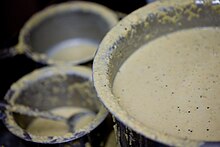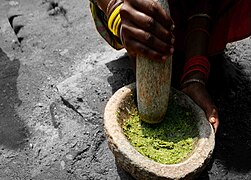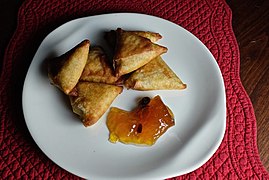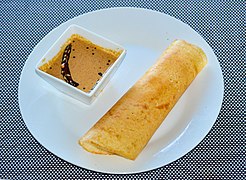List of chutneys
Appearance

This is a list of notable chutney varieties. Chutney is a sauce and condiment in Indian cuisine, the cuisines of the Indian subcontinent and South Asian cuisine. It is made from a highly variable mixture of spices, vegetables, or fruit.[1] Chutney originated in India, and is similar in preparation and usage to a pickle.[1][2] In contemporary times, chutneys and pickles are a mass-produced food product.
Chutneys
[edit]


- Blatjang —a South African chutney made from dried fruit.
- Branston Pickle—a jarred, mass-produced pickled chutney first made in England in 1922 by Crosse & Blackwell.[3][4][5] It is sweet and spicy with a chutney-like consistency, containing chunks of vegetables in a thick brown sticky sauce.[6]
- Chammanthi podi—a dry condiment and coconut chutney[7] from the Indian state of Kerala.
- Coconut chutney—a South Indian chutney side dish and condiment,[8] it is common in South Indian states. It is made with coconut pulp ground with other ingredients such as tamarind, green chili peppers and coriander.[8]
- Coriander chutney—common in Indian cuisine.[9][10][11][12]
- Dahi chutney—strained yogurt mixed into a chutney of mint and onions, popular in South India.
- Eromba—common in Manipuri cuisine.
- Garlic chutney—prepared using fresh garlic, dry or fresh coconut, groundnuts and green or red chili peppers, prepared in both wet and dried forms.[13][14][15][16][17]
- Gooseberry chutney—gooseberry (amla) chutney or "amlakir chutney" is common in Bengali cuisine. It is prepared by boiling raw sliced gooseberries in spicy jaggery or sugar syrup.[18]
- Green mango chutney—an Indian chutney prepared using unripe mangoes.
- Hara choley chutney—made with raw unripe green chickpeas, often mixed with green coriander leaves.
- Hog plum chutney—common in Bengali and Karnataka cuisine. It is called "Amrar chutney" in West Bengal. Ambade (tulu) chutney made from hog plum is a special dish from coastal districts of the Karnataka state of India (Bharat).[19]
- Kachri ki chutney—made with kachri (wild melon).
- Major Grey's Chutney—reputedly created by a 19th-century British Army officer of the same name who, though likely apocryphal,[20][21][22] presumably lived in British India.[23][24] It has been described as a mild chutney compared to others that have a spicier flavor profile.[25]
- Mango ginger chutney—a Bengali chutney prepared using mango ginger (amada) and tamarind (tetul) paste. Usually served as a condiment with samosa (singara) and other fritters.[26]
- Papaya chutney—a chutney common in Bengali cuisine. This chutney which is also called "plastic chutney" is prepared with boiling fresh sliced green papaya in water with sugar and lemon juice. Dried fruits like raisins and cashews may also be added later.[27]
- Peanut chutney—a mildly spicy chutney that can be used to accompany many various foods.
- Pineapple chutney—common in Bengali cuisine as "anaras er chutney". This chutney is prepared by boiling thin slices of pineapple (anaras) in sugar or jaggery syrup. Pomegranate seeds can also be added with sliced pineapples.[28]
- Pudina chutney—prepared using mint.[29]
- Ridge gourd chutney—part of Udupi cuisine eaten during the meal or as accompaniment to snacks like dosa or idli.[30]
- Saunth—a sweet chutney used in Indian chaats, made from dried ginger (sooth) and tamarind (imli) paste, hence the name.[31]
- Tamarind chutney—also known as imli chutney, it is used in some Indian snacks. Tamarind chutney made from imli, banana, and some spices that can also be used with samosa, kachori, and other fried Indian snacks.[32]
- Tomato chutney—a type of chutney prepared using tomatoes as a primary ingredient.[33] Tamtar kasundi originated in Bengal and is typically a spicy and savory tomato and mustard chutney.[34] Tomato chutney has been a mass-produced product in the United States.[35] Gordon & Dilworth in New York produced it in the 1890s–1900s (decade), and exported some of the product.[35][36]
Gallery
[edit]-
A close-up view of Branston Pickle
-
Chutney being hand-made
-
Various jarred chutneys
-
Close-up view of a cranberry chutney
-
Major Grey's Chutney and vegetable samosas
-
Peanut chutney (top) with a dosa
-
Homemade tomato chutney
See also
[edit]- Anglo-Indian cuisine – Cuisine originated in the British Raj
- Cheese and pickle sandwich – British sandwich
- Chow-chow – Relish
- Chutnification – 1981 novel by Salman Rushdie
- List of ancient dishes
- List of condiments
- List of fruit dishes
- List of Indian condiments
- List of Indian pickles
- List of Pakistani condiments
- List of pickled foods
- Piccalilli – British relish of chopped pickled vegetables and spices
- South Asian pickles – Pickled varieties of vegetable and fruit
References
[edit]- ^ a b Gisslen, W. (2010). Professional Cooking, College Version. John Wiley & Sons. p. 202. ISBN 978-0-470-19752-3. Retrieved October 30, 2017.
- ^ Raghavan, S. (2006). Handbook of Spices, Seasonings, and Flavorings, Second Edition. CRC Press. p. 255. ISBN 978-1-4200-0436-6. Retrieved October 30, 2017.
- ^ Ruddick, Graham (30 Oct 2012). "Branston Pickle sold to Japan's Mizkan in £92.5m deal". The Telegraph. Retrieved 2017-10-26.
- ^ Ayto, J. (2012). The Diner's Dictionary: Word Origins of Food and Drink. Oxford Quick reference collection. OUP Oxford. p. 43. ISBN 978-0-19-964024-9. Retrieved 26 October 2017.
- ^ van Wyk, B.E. (2014). Culinary Herbs and Spices of the World. University of Chicago Press. p. 36. ISBN 978-0-226-09183-9. Retrieved 26 October 2017.
- ^ Martin, K. (2017). Famous Brand Names and Their Origins. Pen & Sword Books Limited. pp. 8–9. ISBN 978-1-78159-015-7. Retrieved 27 October 2017.
- ^ Kannampilly, V. (2003). The Essential Kerala Cookbook. Penguin Books. p. 224. ISBN 978-0-14-302950-2. Retrieved October 26, 2017.
- ^ a b Wahhab, I.; Singh, V. (2016). The Cinnamon Club Cookbook. Bloomsbury Publishing. p. 160. ISBN 978-1-4729-3307-2. Retrieved October 26, 2017.
- ^ Madavan, V. (2009). Cooking the Indian Way. Cooking around the world. Lerner Publishing Group. p. 60. ISBN 978-0-7613-4395-0. Retrieved October 30, 2017.
- ^ Hutton, W.; Kawana, M.; Choi, S.C. (2012). Cook's Guide to Asian Vegetables. Tuttle Publishing. p. 171. ISBN 978-1-4629-0716-8. Retrieved October 30, 2017.
- ^ Sodha, M. (2016). Made in India: Cooked in Britain: Recipes from an Indian Family Kitchen. Penguin Books Limited. p. pt414. ISBN 978-0-241-27883-3. Retrieved October 30, 2017.
- ^ Makan, C. (2017). Chai, Chaat & Chutney: a street food journey through India. Octopus Books. p. 404. ISBN 978-1-78472-303-3. Retrieved October 30, 2017.
- ^ Gopal, Sena Desai (June 19, 2017). "Recipe for Coconut-garlic Chutney". The Boston Globe. Retrieved October 26, 2017.
- ^ Bharadwaj, M. (2005). The Indian Spice Kitchen: Essential Ingredients and Over 200 Authentic Recipes. Hippocrene Books, Incorporated. p. 113. ISBN 978-0-7818-1143-9. Retrieved October 26, 2017.
- ^ The Gazetteer of Bombay Presidency. The Gazetteer of Bombay Presidency. Printed at the Government Photozinco Press. 1961. p. 237. Retrieved October 26, 2017.
- ^ Koranne-Khandekar, Saee (June 23, 2017). "A case for chutney". Live Mint. Retrieved October 26, 2017.
- ^ Thaker, A.; Barton, A. (2012). Multicultural Handbook of Food, Nutrition and Dietetics. Wiley. p. 44. ISBN 978-1-4051-7358-2. Retrieved October 26, 2017.
- ^ Kitchen, Archana's. "Sweet & Spicy Amla Chutney Recipe". Archana's Kitchen. Retrieved 2020-07-29.
- ^ "Hog plum chutney, Ambate kayi chutney". udupi-recipes.com. Retrieved 10 January 2020.
- ^ "Chutney Origins". FoodReference.com. Retrieved 2017-01-14.
- ^ Carpender, D. (2004). 500 More Low-Carb Recipes. Fair Winds Press. p. 442. ISBN 978-1-61673-783-2. Retrieved October 27, 2017.
- ^ Kitchen, A.T. (2012). Simple Weeknight Favorites: More Than 200 No-Fuss, Fullproof Meals. America's Test Kitchen. p. pt151. ISBN 978-1-936493-20-3. Retrieved October 27, 2017.
- ^ Scott, L. (2012). The Complete Idiot's Guide to Sugar-Free Cooking and Baking. DK Publishing. p. 68. ISBN 978-1-101-58577-1. Retrieved October 27, 2017.
- ^ Helstosky, C. (2014). The Routledge History of Food. Routledge Histories. Taylor & Francis. p. 330. ISBN 978-1-317-62113-3. Retrieved October 27, 2017.
- ^ Sheraton, Mimi (July 10, 1982). "De Gustibus; Tea and Chutney: 2 Different Greys". The New York Times. Retrieved October 27, 2017.
- ^ Nair, Pradeepa (2019-09-06). "Mango Ginger Chutney". Culinary Labs. Retrieved 2020-07-29.
- ^ "Bengali Plastic Chutney - Sweet Raw Papaya Chutney | Food Indian". foodindian.org. Retrieved 2020-07-07.
- ^ "Pineapple chutney". BBC Good Food. Retrieved 2020-07-30.
- ^ Prasad, V. (2011). Indian Vegetarian Cooking from an American Kitchen. Random House Publishing Group. p. pt25. ISBN 978-0-307-87439-9. Retrieved October 30, 2017.
- ^ "Ridge Gourd Chutney without Coconut". udupi-recipes.com. Retrieved 10 January 2020.
- ^ "Imli (Tamarind) Saunth (Dried Ginger) Chutney conserve Recipe". Indiacurry.com. Retrieved 17 May 2012.
- ^ vikas, m. "5 Best Chutney Recipes That Can Make Your Food & Snacks Tasty". bestindianrecipesfood.blogspot.com/. Retrieved February 2, 2021.
- ^ Sudheer, K.P.; Indira, V. (2007). Post Harvest Technology of Horticultural Crops. Horticulture science series. New India Pub. Agency. p. 166. ISBN 978-81-89422-43-1. Retrieved October 27, 2017.
- ^ Green, A. (2015). The Magic of Spice Blends: A Guide to the Art, Science, and Lore of Combining Flavors. Quarry Books. p. 105. ISBN 978-1-63159-074-0. Retrieved October 27, 2017.
- ^ a b Treasury Decisions Under the Customs, Internal Revenue, and Other Laws: Including the Decisions of the Board of General Appraisers and the Court of Customs Appeals. U.S. Government Printing Office. 1910. p. 4. Retrieved October 27, 2017.
- ^ "El Paso Herald from El Paso, Texas on March 19, 1897". El Paso Herald. p. 4. Retrieved October 27, 2017.
External links
[edit]Wikimedia Commons has media related to Chutney.








